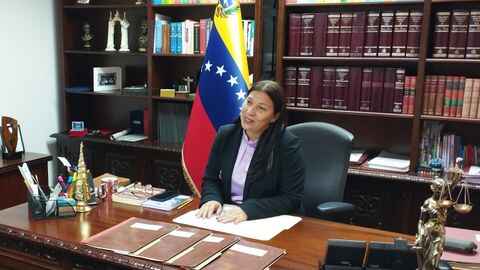The death of a 12-year-old girl who purportedly died after taking tranquilizer pills and failing to fall asleep as part of a TikTok challenge is attributed by Venezuelan President Nicolas Maduro to the social media platform.
TikTok was fined $10 million by the Venezuelan Supreme Court for “not implementing measures” to stop viral video challenges that are said to have lately resulted in the deaths of three Venezuelan children.
In addition to giving TikTok eight days to pay the fine for its careless actions, Judge Tania D’Amelio ordered the video service provider to establish an office in Venezuela to monitor material and ensure it conforms with local regulations.
How Venezuela would compel TikTok, whose parent business is headquartered in China, to pay the fee was not explained by the judge.
In the past, Venezuela has blocked dozens of websites that violated rules established by its telecoms commission.
The Associated Press reached out to TikTok for comment, but the company did not immediately reply.
Nicolas Maduro, the president of Venezuela, accused TikTok in November of being responsible for the death of a 12-year-old girl who allegedly died after taking tranquilizer tablets and failing to go asleep as part of a TikTok challenge.
Hector Rodriguez, Venezuela’s Minister of Education, also reported last month that a 14-year-old died as a result of participating in a TikTok challenge that involves sniffing drugs. Additionally, on November 21, Venezuela’s attorney general accused TikTok of causing a third child’s death through video challenges.
Social media prohibition
Under Maduro, dozens of television and radio stations have been shut down in Venezuela due to their coverage of the news.
A group that monitors media freedom in the South American nation, VE Sin Filtro, claims that over 60 websites run by journalistic organizations and human rights organizations were blocked at various points this year.
As thousands of Venezuelans demonstrated against Maduro’s reelection in August, the country blocked the social networking site X.
Following Maduro’s accusation that Elon Musk, the company’s owner, was using X to “orchestrate attacks against Venezuela,” the Venezuelan government first blocked the social networking platform for ten days.
Musk had accused Maduro of manipulating the July 28 poll, which the Carter Center, a global election monitoring organization, and the United Nations claimed did not adhere to international norms.
Although X is currently accessible through privately owned internet providers in Venezuela, Movilnet, the country’s state-owned internet service, continues to prohibit it.






